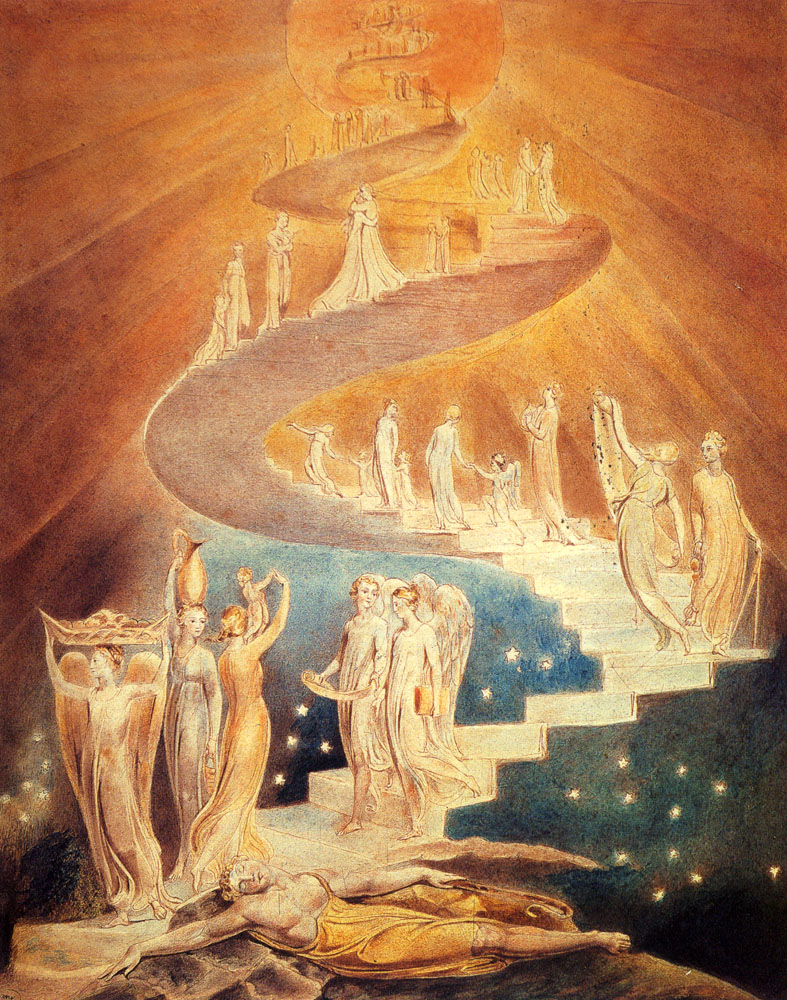Spiritual Sunday
Today’s Old Testament reading in our church is about Jacob’s ladder, the dream vision that Jacob receives from God about his future. Denise Levertov uses the story to describe how poetry is composed.
First, here’s the account in the Book of Genesis (28:10-19a):
Jacob left Beer-sheba and went toward Haran. He came to a certain place and stayed there for the night, because the sun had set. Taking one of the stones of the place, he put it under his head and lay down in that place. And he dreamed that there was a ladder set up on the earth, the top of it reaching to heaven; and the angels of God were ascending and descending on it. And the LORD stood beside him and said, “I am the LORD, the God of Abraham your father and the God of Isaac; the land on which you lie I will give to you and to your offspring; and your offspring shall be like the dust of the earth, and you shall spread abroad to the west and to the east and to the north and to the south; and all the families of the earth shall be blessed in you and in your offspring. Know that I am with you and will keep you wherever you go, and will bring you back to this land; for I will not leave you until I have done what I have promised you.” Then Jacob woke from his sleep and said, “Surely the LORD is in this place– and I did not know it!” And he was afraid, and said, “How awesome is this place! This is none other than the house of God, and this is the gate of heaven.”
So Jacob rose early in the morning, and he took the stone that he had put under his head and set it up for a pillar and poured oil on the top of it. He called that place Bethel.
In Levertov’s 1961 poem, the stairway is the transcendent poem. It must be built of the tool we have, which is imperfect language. Rather than directly expressing radiant and evanescent angels, the poet must deal with sharp angles. The doubting night gray of the sky testifies to the challenge he or she faces.
It is a theme in much of Levertov’s poetry, however, that struggling in the face of doubt is how we experience the divine. Men may not be angels and the rocks we use for building may scrape our feet. Nevertheless, just as Jacob, his head pillowed on a rock, sees a stairway to heaven, so does our rock have “a glowing tone of softness.” The poet feels the light brush of angel wings and the poem ascends:
The Jacob’s Ladder
By Denise Levertov
The stairway is not
a thing of gleaming strands
a radiant evanescence
for angels’ feet that only glance in their tread, and
need not touch the stone.
It is of stone.
A rosy stone that takes
a glowing tone of softness
only because behind it the sky is a doubtful,
a doubting night gray.
A stairway of sharp
angles, solidly built.
One sees that the angels must spring
down from one step to the next, giving a little
lift of the wings:
and a man climbing
must scrape his knees, and bring
the grip of his hands into play. The cut stone
consoles his groping feet. Wings brush past him.
The poem ascends.
I pick up at least two other poems that Levertov may be alluding to. In “The Altar,” George Herbert talks about the paradox of a hard stone altar being a means of opening a hard heart to God. (See my post on “The Altar” here.)
A HEART alone
Is such a stone,
As nothing but
Thy pow’r doth cut.
Wherefore each part
Of my hard heart
Meets in this frame
To praise thy name.
The other is Yeats’ “The Circus Animals’ Desertion,” which has an image of a ladder. The poet laments the end of his youthful romanticism, which once gave him marvelous poetic images (his circus animals). Now, however, he feels trapped in his own grimy and mundane reality.
Those masterful images because complete
Grew in pure mind, but out of what began?
A mound of refuse or the sweepings of a street,
Old kettles, old bottles, and a broken can,
Old iron, old bones, old rags, that raving slut
Who keeps the till. Now that my ladder’s gone,
I must lie down where all the ladders start
In the foul rag and bone shop of the heart.
The miracle is that, out of this unpromising material, Yeats constructs the ladder that is his poem. For those of you wrestling with your doubts about whether transcendence exists, you can look to the miraculous existence of poetry and be reassured.


